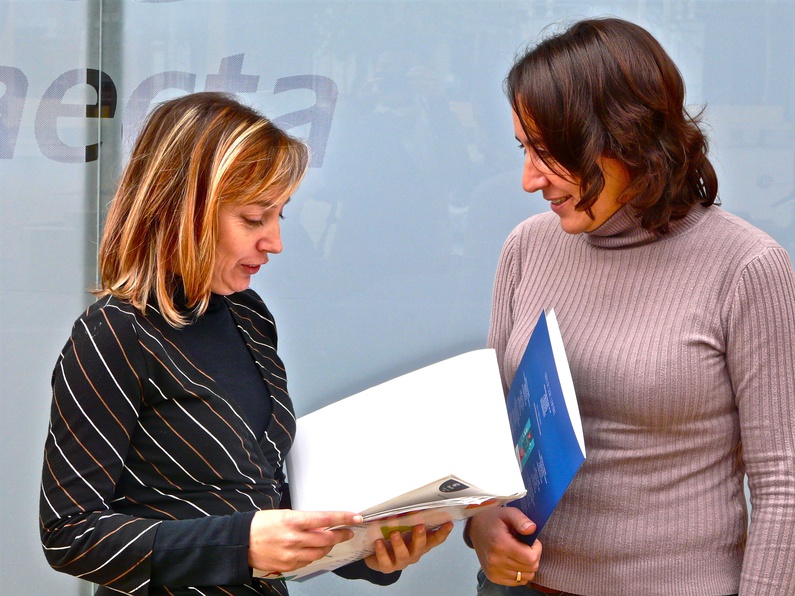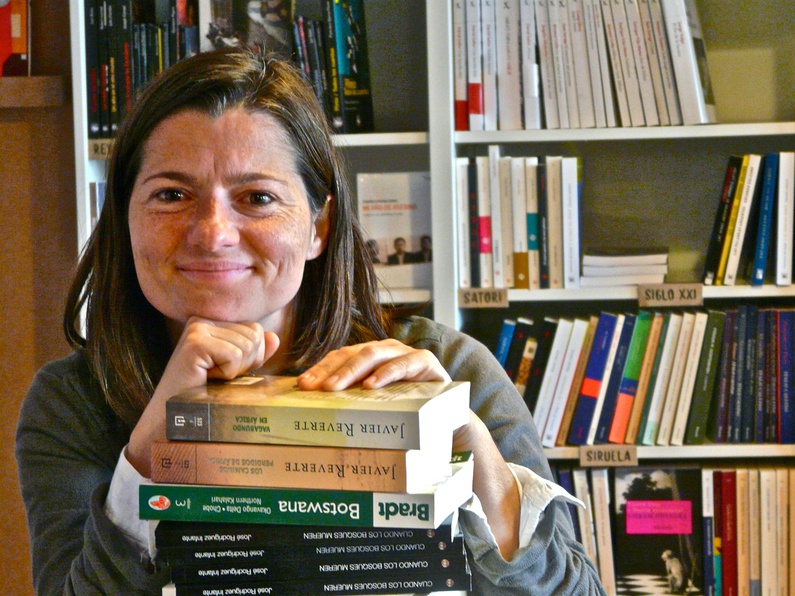
Seville: Youth Respond to the Crisis with Co-op
Published on
Translation by:
Kait BolongaroTheir small business knows no crisis. In Seville, Mayte, Alejandro and Ana all made the crazy bet to set up their company despite the failure of the Spanish economy. Today, they are still here, because of a common point: the cooperative.
In France, like in Spain, the term 'coop' often evokes old mustachioed wine makers more than young entrepreneurs. Instead, we think of a model of post-68 utopia (in reference to the period of civil unrest in France in May-June 1968 — Editor), ready to fight today but will become disillusioned tomorrow. Yet in Andalusia, hard hit by the crisis, co-ops sprout like mushrooms. Far from being confined to Dad's agriculture (which represents only 14% of Spanish cooperatives — Ed.), the coop also exists in version 2.0. The principle is simple: at least three socios (partners — Trad.) contribute to equality, fairly distributed decision-making power and no hierarchy. Unlike a 'traditional' business, workers are also investors, and are involved in all stages of production.
Far from clichés, the co-op version 2.0
Ana and Alejandro, the bosses of Marketing Online, work in a modern neighbourhood on the outskirts of the city. Ironically, Avenida tecnologia (Technology Avenue — Trad.), where the outfit is located, was built just before the crisis to host companies. It is now half deserted. Despite their very different backgrounds, the two socios (partners — Trad.) decided to take the plunge. Ana, a smiling 40-something, was one of the last to leave her advertising agency before the company went bust. For 27-year-old Alejandro, this is his second time he is part of a co-op.
An example of the work done by Marketing Online
Ana always wanted to be her own boss; but her dream came true almost by accident. Just as she was about to begin, an obvious choice emerged: the model of the co-op. The decision was not based on idealism. "Our choice is pragmatic," explains Ana. "We had a common project, and a co-op corresponded best to our economic and personal goals." And it's working. Since its creation, Marketing Online has seen its orders explode with clients ranging from a psychology practice to a cannery.
Rubber Vaginas and Equestrian Therapy
Laura Castro and Salomé Gomez see more and more projects like Ana's and Alejandro's. Together they run the Andalusian Federation of Cooperatives in Seville (FAECTA). Since the crisis, they have seen the development of this mix of entrepreneurship and solidarity. "We see more and more service companies founded by young graduates who are very well trained." In a region where the unemployment rate exceeds 30%, the co-op appears to be an alternative to emigration. "Entrepreneurship is becoming a necessity," they summarise.
 Andalusia is a pioneer in the field. With its 3500 co-ops, the sector represents tens of thousands of jobs, the majority of which are women. "This is due to the fact that these are structures that promote equality," insists Salomé. "The principle is simple and unchanging: one person = one vote. And in a society where women are still responsible for most of the household chores, working in a co-op makes it easier to combine work and family lives." Atleast one can say that Andalusian socios have an imagination. Among the business projects supported by FAECTA, Laura and Salomé have seen almost everything: from equestrian therapy and coffins to rubber vaginas.
Andalusia is a pioneer in the field. With its 3500 co-ops, the sector represents tens of thousands of jobs, the majority of which are women. "This is due to the fact that these are structures that promote equality," insists Salomé. "The principle is simple and unchanging: one person = one vote. And in a society where women are still responsible for most of the household chores, working in a co-op makes it easier to combine work and family lives." Atleast one can say that Andalusian socios have an imagination. Among the business projects supported by FAECTA, Laura and Salomé have seen almost everything: from equestrian therapy and coffins to rubber vaginas.
Audacity
It has been almost three years since Mayte put aside her personal life. The co-founder of La extravagante, a bookstore, she speaks with the energy of those who want to conquer the world. Yet her eyes reveal the hours spent on accounting or filing. "People think that owning a bookstore means sitting and reading, but this is not true!" she says with a laugh. In another life, Mayte was a professor of literature in Puerto Rico, public relations director for a theatre, then a bookseller at FNAC — the job she left to start this bookstore with three friends.
It is not without a lot of dreams and disappointments under her belt that bubbly Mayte embarked on her co-op adventure. Today, she does not regret her choice and accepts the crazy part inherent of the project. "I had tons of illusions: everything seemed possible and easy. But it is precisely because we all began with the same level of ignorance that it worked. Arriving at the technical office, I did not even know that I could create a co-op. I knew nothing. The beginning was very hard because even if I have an entrepreneurial spirit, numbers are not my thing!"
 Like Mayte, Alejandro and Ana claim the element of madness that pushed them to make the leap. Perhaps it is these crazy people who will gradually bring the Andalusian economy back on its feet. FAECTA's figures show that co-ops withstand crisis better than traditional businesses. As they are very attached to their project, partners consider closing as a last resort. This solidarity makes sense in a context of crisis where individual business becomes almost impossible, if only for financial reasons. On the flip side of the coin, there are many who are underpaid, as they do not keep track of their work hours. The essential remains: to know a greater sense of shared freedom.
Like Mayte, Alejandro and Ana claim the element of madness that pushed them to make the leap. Perhaps it is these crazy people who will gradually bring the Andalusian economy back on its feet. FAECTA's figures show that co-ops withstand crisis better than traditional businesses. As they are very attached to their project, partners consider closing as a last resort. This solidarity makes sense in a context of crisis where individual business becomes almost impossible, if only for financial reasons. On the flip side of the coin, there are many who are underpaid, as they do not keep track of their work hours. The essential remains: to know a greater sense of shared freedom.
THIS ARTICLE IS PART OF A SPECIAL SERIES DEdicated TO seville. IT'S PART OF EUTOPIA: TIME TO VOTE, A PROJECT RUN BY CAFÉBABEL IN PARTNERSHIP WITH THE HIPPOCRÈNE FOUNDATION, THE EUROPEAN COMMISSION, THE MINISTRY OF FOREIGN AFFAIRS AND THE EVENS FOUNDATION.


Translated from Séville : face à la crise, les jeunes brandissent la « Coop »



